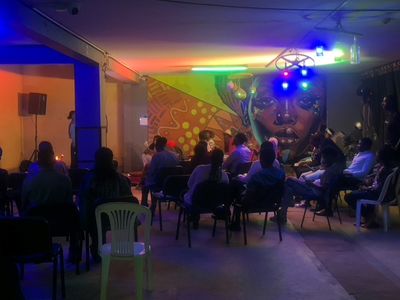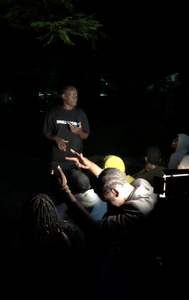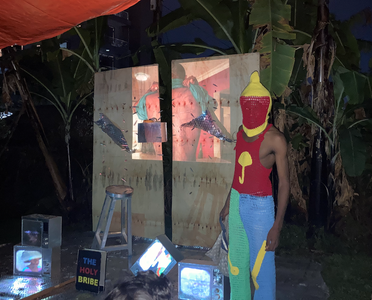From the Field – Speaking in Code: Youth Poetry and the Politics of Possibility in Urban Uganda by PhD candidate, Sarah Lewinger
From the Field — Speaking in Code: Youth Poetry and the Politics of Possibility in Urban Uganda
By Sarah Lewinger, PhD Candidate, Boston University
I came to Kampala, Uganda for the first time in 2018 to study the effects of abstinence-only education and how the transnational evangelical lobby has influenced Ugandan politics. During my preliminary fieldwork in 2023, I examined youth involvement in charismatic Pentecostal Christianity, spending eight weeks attending services, fellowships, and bible studies at four different churches. During this time, I stumbled upon Ekyoto Night – ekyoto means bonfire in Luganda, around which elders would traditionally tell stories – after seeing a Facebook post advertising the event. I listened as young poets grappled with major existential questions. One poet shared a poem that essentially asked, how can you believe in a God who has cursed you with an identity that makes you feel unlovable and unacceptable?

This was June 2023, right after the 2023 Anti-Homosexuality Act had passed, restricting freedom of speech on LGBT topics with up to 20 years’ imprisonment. And yet, here were poets engaging with this topic and having other politically sensitive discussions.
For context, Uganda has had the same president since 1986, who is deeply unpopular among young people – the majority of the country – and operates an increasingly authoritarian state where public criticism of the government can result in arrest or disappearance. Poetry spaces are not necessarily safe spaces, but controversial speech is accepted, as long as it is coded enough to maintain plausible deniability. Poets use allusions and metaphors, often biblical, to share their sorrow and anger. As I began attending more poetry events, I was struck by how they resembled churches. Poets often adopt similar affectations as charismatic preachers, and audiences mirror the unbridled enthusiasm of churchgoers.

When I came back to Kampala the following summer to begin my long-term fieldwork, my project had shifted to focus more on poetry and performance and how these spaces incubate alternative political imaginations. For the past ten months, I’ve attended dozens of poetry shows, from free open mic nights at bars with half-interested drunken patrons, to expensively ticketed, elaborately choreographed shows with costumes and smoke machines.
I’ve also been closely involved with two poetry workshops, and conducted in-depth interviews with many poets about what draws them to poetry and what keeps them motivated despite the risks and limited financial rewards. What I’m discovering is how poetry functions as quasi-religious practice – facilitating spaces for healing and transcendence, while remaining distinctly amoral – challenging conventional boundaries between sacred and secular.
With massive youth unemployment and limited access to formal economic opportunities, poetry functions as critical infrastructure, with poets creating alternative systems for social reproduction, emotional support, and political imagination.

For many educated but underemployed urban youth, poetry provides access to elite spaces they could not otherwise enter: performing at high-end restaurants where they can’t afford a single dish, maintaining an insider/outsider position that reflects broader contradictions in their lives.
Poetry communities operate according to complex networks of reciprocal exchange, where mentorship, opportunities, and intimate relationships become intertwined in ways that reflect broader social logics of patronage and obligation. Young Ugandans are creating alternative forms of value that operate within capitalism, without being reducible to it – revealing how people generate meaning, community, and political possibility under authoritarian rule and economic dysfunction.